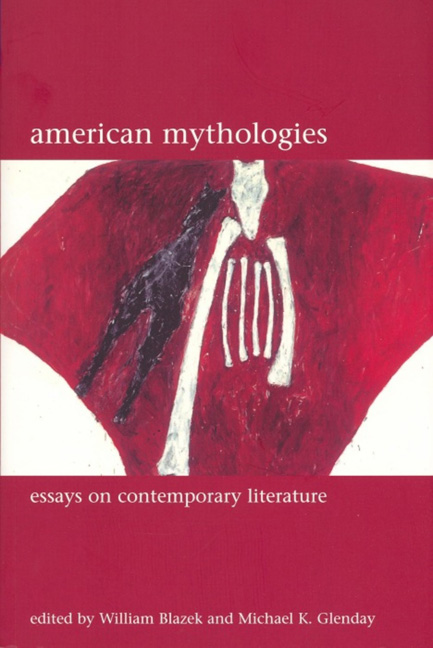Book contents
- Frontmatter
- Dedication
- Contents
- Acknowledgements
- Introduction
- 1 Indians with Voices: Revisiting Savagism and Civilization
- 2 Wild Hope: Love, Money and Mythic Identity in the Novels of Louise Erdrich
- 3 Float Like a Butterfly, Sting Like a Bee: Mythologies of Representation in Selected Writings on Boxing by Norman Mailer
- 4 The Secret Sharing: Myth and Memory in the Writing of Jayne Anne Phillips
- 5 The Individual's Ghost: Towards a New Mythology of the Postmodern
- 6 ‘Cheap, On Sale, American Dream': Contemporary Asian American Women Writers’ Responses to American Success Mythologies
- 7 ‘No Way Back Forever’: American Western Myth in Cormac McCarthy's Border Trilogy
- 8 Native American Visions of Apocalypse: Prophecy and Protest in the Fiction of Leslie Marmon Silko and Gerald Vizenor
- 9 The Brave New World of Computing in Post-war American Science Fiction
- 10 Mythologies of ‘Ecstatic immersion’: America, The Poem and the Ethics of Lyric in Jorie Graham and Lisa Jarnot
- 11 Whose Myth is it Anyway? Coyote in the Poetry of Gary Snyder and Simon J. Ortiz
- 12 Aging, Anxious and Apocalyptic: Baseball's Myths for the Millennium
- 13 Finding a Voice, Telling a Story: Constructing Communal Identity in Contemporary American Women's Writing
- Notes on Contributors
- Index
6 - ‘Cheap, On Sale, American Dream': Contemporary Asian American Women Writers’ Responses to American Success Mythologies
- Frontmatter
- Dedication
- Contents
- Acknowledgements
- Introduction
- 1 Indians with Voices: Revisiting Savagism and Civilization
- 2 Wild Hope: Love, Money and Mythic Identity in the Novels of Louise Erdrich
- 3 Float Like a Butterfly, Sting Like a Bee: Mythologies of Representation in Selected Writings on Boxing by Norman Mailer
- 4 The Secret Sharing: Myth and Memory in the Writing of Jayne Anne Phillips
- 5 The Individual's Ghost: Towards a New Mythology of the Postmodern
- 6 ‘Cheap, On Sale, American Dream': Contemporary Asian American Women Writers’ Responses to American Success Mythologies
- 7 ‘No Way Back Forever’: American Western Myth in Cormac McCarthy's Border Trilogy
- 8 Native American Visions of Apocalypse: Prophecy and Protest in the Fiction of Leslie Marmon Silko and Gerald Vizenor
- 9 The Brave New World of Computing in Post-war American Science Fiction
- 10 Mythologies of ‘Ecstatic immersion’: America, The Poem and the Ethics of Lyric in Jorie Graham and Lisa Jarnot
- 11 Whose Myth is it Anyway? Coyote in the Poetry of Gary Snyder and Simon J. Ortiz
- 12 Aging, Anxious and Apocalyptic: Baseball's Myths for the Millennium
- 13 Finding a Voice, Telling a Story: Constructing Communal Identity in Contemporary American Women's Writing
- Notes on Contributors
- Index
Summary
I
The process of becoming American always and inevitably involves confronting and relating to American success mythologies. Furthermore, since the stereotypes for what comprises ‘typical American’ are based on what American success mythologies valorize, American success stereotypes are always and inevitably the byproducts of American success mythologies. Historically, Asian Americans and other immigrants have wanted to believe that they could somehow become accepted as ‘typical Americans’ if they only tried hard enough to assimilate.
All the contemporary Asian American women writers whom I will discuss in this essay reveal the attractions as well as the pitfalls awaiting immigrants from Asia who betray their traditional values in order to follow American success mythologies. Instead, they advocate syncresis for their characters as a coping mechanism between the hopes and dreams inspired in them by American success mythologies and the reality they experience after their immigration to American shores. Syncresis, the combining of elements from both cultures, is a balanced mixture of endlessly negotiated revisions and modifications of juxtaposed elements of both original and new American ‘cultural regimes of truth’ (Foucault 31). It is a non-binary recombinant modification of both Asian and American success mythologies and is not a repudiation of either culture, but an ongoing, endless cycle of flow in both directions.
The authors I will discuss in this essay describe this attempt at syncresis, none more poignantly and tragically than M. Evelina Galang (b. 1961) in her first collection of stories, Her Wild American Self (1996), through her description of the fate of the idealistic Uncle Victor. Indeed, all the authors whom I will discuss have recently published first works such as Galang's, where they describe harrowing individual and familial attempts to assimilate in the face of racist and sexist American success mythologies. R. A. Sasaki (b. 1952) focuses in The Loom and Other Stories (1991) on the tragic results of attempts by first- and second-generation Japanese Americans in San Francisco to live by American success mythologies and to be accepted as Americans.
- Type
- Chapter
- Information
- American MythologiesNew Essays on Contemporary Literature, pp. 105 - 127Publisher: Liverpool University PressPrint publication year: 2005

